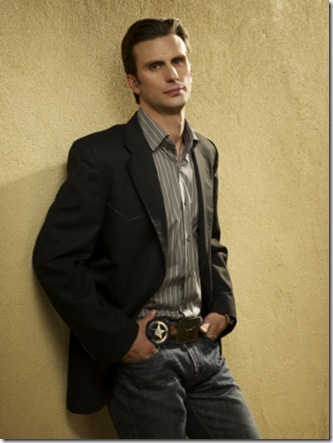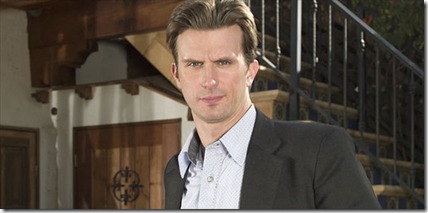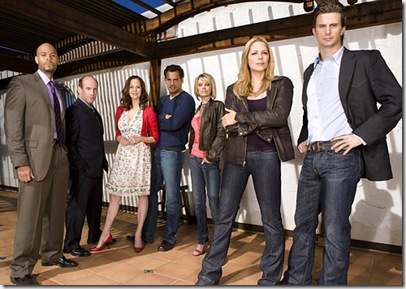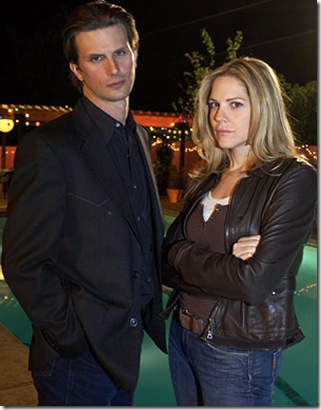A few days ago, I was able to take part in a Q&A session with Fred Weller, who plays Marshal Marshall Mann on the USA Network’s hit show, In Plain Sight [Sundays, 10-9C]. Marshall may be Mary Shannon’s partner, but he is an interesting character in his own right – as is the man who plays him. One thing that is almost immediately apparent, is that both share a dry sense of humor.
Also taking part in the session were: Jamie Steniberg [Starry Constellation], Troy Rogers [thedeadbolt.com], Chandra Williams [TVJolts.com], Beth Ann Henderson [nicegirlstv.com], Jamie Ruby [Media Blvd], and Kendra White [no affiliation mentioned…].
J. Steinberg: I was wondering, how do you and Mary continue to maintain such great chemistry between each other?
F. Weller: Well, we try to get drunk together as often as possible when we’re not working. And our kids play together, and we’re friends. I think that helps. And also, on the set, Mary’s very professional, and so she doesn’t, both of us try to adhere to the unspoken codes of conduct on the set, so I don’t think that we give each other any cause for irritation in the work environment.
J. Steinberg: What’s been your most memorable moment you’ve had from filming season two?
F. Weller: Oh my goodness, what an excellent question. The most memorable moment would have to be when Mary was laughing so hard she was threatening to need a costume change from potential “laugh pee” after I was kicking in the door and my foot went through the door panel instead of opening the door. And then I was stuck there in the door, unable to retract my booted foot, and the cameras were running, so there is footage of that somewhere.
J. Steinberg: Now, Mary was on Chelsea Lately last night, and she mentioned an interesting event that happened between her and her daughter in order to get her to keep her shoes on. Have you brought your kids to the set, and do you have any interesting tales from their adventures there?
F. Weller: I brought my daughter to the set a few times. She’s not yet as sophisticated as Mary’s kids around the set. Mary’s kids will actually say, “Shh, we’re rolling.” She’s not really at that level. Let me see. Do I have any child-related anecdotes? Gosh, maybe one will come to me. She—
J. Steinberg: Does she like the catering station? Because usually they’re stocked with pretty good stuff for kids and adults.
F. Weller: Well, she’s a little bit of a social butterfly, something that I want to nip in the bud if I can. I’m hoping to eventually groom her into a very bookish child who doesn’t date boys at all, but, at the moment, she loves just being around crowds of people. So that was basically my experience of her being on the set was just one more setting in which I was concerned that she might get to be popular in school, and I want to avoid that at all costs. She just loves, she loves crowds and people, and she seems most content when she’s away from home and around a bunch of people who aren’t her parents.
J. Steinberg: Does that mean you’d shy away from letting her have an acting career?
F. Weller: I’m going to try to keep the secret from her that I’m an actor at all. It’s going to be tough. Obviously, you want to have publicity as an actor, but I’m going to try to persuade her I’m a professor of something, maybe, I don’t know, something really nerdy, comparative literature. I don’t know. I haven’t figured it out yet. I’ve got to figure it out before she really masters the alphabet ….
T. Rogers: How is Mary’s post-traumatic stress affecting Marshall?
F. Weller: Well, it’s one more occasion to evoke Marshall’s affection for her, his simmering romantic feelings. In a way, it helps him to be able to be there for her and to try to strengthen the bond between them, but it also concerns him because he is truly concerned about her well being and does want the best for her. But it enables them to bond and enables him to come in and try to be the knight in shining armor. It’s right up his alley. He dabbles in psychology. He dabbles in every other field. He’s ever the dilettante, so it enables them to bond. So like, of course, there’s good and bad for Marshall.
T. Rogers: Alright. Now, speaking of his feelings for her, how does he feel towards Raphael?
F. Weller: He feels competitive towards him. On the one hand, I think he’s also somewhat dismissive of him. I don’t think he takes their relationship seriously. Raphael is a big, handsome guy, so there is a lot to be jealous of, but he’s a nice guy, so Marshall’s, whatever resentments and jealousies he has, and he does have them, he’s got to keep a lid on them. He’s got to keep them repressed.
T. Rogers: Alright, fair enough. How will Marshall and Dershowitz’s relationship evolve this season?
F. Weller: They will become closer. You’ll find out, well, I think we, actually, you already saw on the first episode that Marshall … bonded over the near-death experience. They’re hanging out a lot, but we’ll actually take a road trip to Philadelphia to help out, in an unofficial capacity, an aging mobster go back to his son’s funeral, and that mobster will be played by Martin Landau.
So Todd and I had quite a great episode together, working with Martin Landau, who’s an amazing person and really loves to socialize and tell stories about all the many great directors he’s worked with. So that was a wonderful experience.
T. Rogers: I have one more quick thing and then I’ll let you go. Have you received any free food from the Artichoke Café yet?
F. Weller No.
T. Rogers: Not yet?
F. Weller: I haven’t even gotten a free drink.
T. Rogers: Sorry. I’m trying to help you, man. I’m trying.
F. Weller Thank you.
C. Williams: How fun is it playing not just any old law man, but a U.S. Marshal? Have you learned anything that helps you in your real life?
F. Weller: It’s really fun to play a lawman who, in theory, has jurisdiction anywhere in the country. Also, an undercover lawman is, I think, an especially cool thing to play because you’ve got an inherent inner, well, not a conflict, but an interesting dynamic that you are enforcing the law, but at the same time, trying to appear like you’re not. Our technical advisor, who is the head of WitSec in California, is on the set every day now, and one of his favorite reminders is that you’re always scanning the horizon for danger. In fact, we poke fun at him whenever he walks over to the set. We just say, “ABS, ABS,” which stands for “always be scanning.”
I don’t know if I’ve learned anything I’ve applied to my life. My life is pretty safe. I don’t have too many run-ins with unsavory characters, but when I do I plan to really scan the hell out of them.
C. Williams: We know tons about Mary and her family but very little about Marshall. Are you just as in the dark about his background, or do you know some details you can share with us?
F. Weller: Well, I’d love to see more on the air. We think about it and secretly joke on the set about what his apartment must look like with all his myriad interests. We hypothesize about what musical instrument he plays. There must be one, and it must be weird. I’m thinking the bassoon, sometimes a French horn. Does he have a bird? I don’t know. I do conjecture about his family life. All we know about his family life is he is a fifth generation U.S. Marshal. I imagine his father was a hard-ass and his mother was an intellectual, but this is just conjecture. The creator might decide something else, something I think is even better. He never ceases to surprise and amaze, I think, with his ideas. He’s a great writer, David Maples, and I’m sure what we do learn about Marshall’s personal life, it’ll be interesting.
B. Henderson: How does this role challenge you?
F. Weller: Well, it’s challenging for the same reason that it’s fun in that it requires comedic and emotional ability. Now, my emotions are not as … as frequently as are Mary’s. Her character is in emotional turmoil much of the time, but at least a couple times a season and certainly more times this season than last, Marshall is in some kind of emotional turmoil. And any time that you’re asked as an actor to exhibit some state that is out of control or should appear out of control, it’s a little more challenging. And then I think comedy is an exacting science. You don’t want to blow the humor if it’s there. If you do it wrong, it’s either funny or it’s not, so the fact that it’s a little, has comedy and emotion is what makes it rich, and it’s also what makes it challenging. You don’t want to disappoint. You don’t want to, when you’ve got such great material, it’s important to rise to it and get it right.
B. Henderson: Speaking of great material to work with, how much input do you actually get to give for the writers or for your character?
F. Weller: Well, I occasionally will talk to David Maples. We’ll joke around. I can’t actually think of something that I said that made it into the script per se, but we’re definitely on the same page about who he is. And David has said that who Mary and I are has started to influence his vision of the characters, sort of a symbiotic relationship because playing a character which you love for a length of time starts to affect your own personality, I think. So the lines tend to blur. I’ve never played anyone that I felt, I’ve never played a character that I felt was closer to me, but I can’t say that David has taken any particular idea of mine. Like I say, I can’t think of one specifically. There have been aspects of the character, ideas of mine that have informed the set dressing, what’s on Marshall’s desk, but I can’t remember saying, “Oh, I think my dad is such and such,” and then it was in the script. But we do have a good relationship with David, and I think that informs his take on the characters we play.
B. Henderson: What scenario would you like to see Marshall in that he’s not been in yet?
F. Weller: Well, I’d like to meet his parents, or one of them. But David likes the mystery of Marshall. He’s said as much. He likes to just discover little tidbits of weirdness that emerge through the course of the story, rather than making the story about Marshall. But I’m sure at some point we’ll see a little more about where he comes from. He claims to have gone to college at the University of Albuquerque and to have been the star of the badminton team there, for example. Does that mean he’s from Albuquerque? I don’t know. I’ll have to sit down and just write out everything that we know about him sometime and his various interests.
B. Henderson: Okay. Well, thank you so much for taking the time with me, and if you’re in charge of the gag reel, I’d be looking forward to that. I’ll be lobbying for that.
F. Weller: Okay. We’re lobbying for it, too.
J. Ruby: So how did you come to get the part of Marshall? Did you audition or were you given the part? How did that happen?
F. Weller: No, I auditioned. In fact, I went to Los Angeles for pilot season. I had been in New York, and I still live in New York. And for years, I had been avoiding going out to Los Angeles for pilot season because it’s quite a grind. You audition for five TV shows a day. And so I’d been doing mostly theater and indie film out of New York, and I hadn’t been for pilot season in, I don’t know, six, seven years. And so I just went out, and it went well for me. And this was the best pilot that I read, and I was fortunate enough to go to network for, I think, half a dozen people wanted me to go. So this was, I think, the second thing I went for, and I was very excited to get it because, well, it’s not your average TV show.
J. Ruby: No, it’s not. So where do you draw your inspiration for your portrayal of the character?
F. Weller: Well, not unlike Marshall, I have a variety of interests and a variety of influences, and I mostly draw the information about Marshall in from our technical advisor. I talk to him when I can on the set, and in terms of his emotional life, it’s pretty much mine. And otherwise, I just try to figure out how to have fun with any given episode.
It’s an interesting thing to do television because it’s a work in progress for you—for the actor, that is—as well as for the writer. We’re all discovering it as we go along, different aspects of the character, they clarify themselves along with the story. It’s not like doing a play or film where you have the whole plot and the character arc from the get-go. You’re signing on with a TV show to do material, sight unseen. You’ve seen the pilot, which is, at least, less than 10% of what you’re going to do if you do this one season. If you do ten seasons, it’s less than, I don’t know how much, one percent. But it’s also exciting. It’s an exciting process to be discovering it like that, as you go.
J. Ruby: Great. So which do you like more: theater, movies, television? Do you plan on going back to theater, or—
F. Weller: Yes, I’ll still do, hopefully, whenever I can, it’s kind of an addiction, I love doing plays. It’s a little more demanding sometimes, but the satisfaction of doing a whole story all at once, going through it at the same time as the audience is very satisfying.
S. Wiebe: You were talking earlier about Marshall being a bit of a dilettante. I’m just wondering which of his many interests is your personal favorite and why.
F. Weller: Well, let’s see. I suppose my favorite would be his medical ability because it’s so far removed from anything I can do. The fact that he can patch up his own bullet wound to his lung, it’s an interest that I think would be useful, and it’s removed from my own fields of interests. I’m a little more of a music and literature person. My big brother is a man of science, an electrical engineer, and I always really admired him growing up. He had this strange capacity that didn’t seem to come from anyone in the family, it was just something that he was born with, and he was always intrigued by how things worked and just had an aptitude for it. And everybody else in the family is basically literature and arts, so that, to me, is fun because I get to pretend that I have that aptitude.
S. Wiebe: I was also thinking that, because Marshall is a bit of a dilettante, he’s more open to change than Mary, and I’m just wondering if that’s the capacity that gives him the wisdom to deal with her post-traumatic stress syndrome in the premiere.
F. Weller: Yes. I think that’s a very good point. I think Marshall is more flexible, more committed to optimism and to a kind of faith. You see in several episodes that Marshall seems to believe in a moral universe, and so when Mary, who is ever the cynic, which I think is really a kind of armor that she adopts to protect herself, when she has some kind of crisis like this I think that the apostle of faith and wisdom and optimism is going to be useful to her. I think that’s a very good point. It’s one of the aspects that I really love about the character is that he’s a believer.
S. Wiebe: Would you also say that, perhaps, because of his dilettantism, he’s also developed maybe a kind of a Zen attitude towards life?
F. Weller: Yes. I think so. It’s difficult to talk about Zen, isn’t it? Because, well, it just leaves the room as soon as you start talking about it, but I think that he certainly attempts to be in the moment and to let things go. I think it was Isaiah Berlin who wrote a famous essay comparing Dostoevsky with Tolstoy. It was about the fox and the hedgehog. He said that there are two types of people, there are foxes and there are hedgehogs, and the fox is someone who has myriad interests. He doesn’t believe in any one shaping idea. He simply embraces various and sundry ideas, and the hedgehog is someone who sees the universe through one controlling idea.
And he said that Tolstoy was a fox who wanted to be a hedgehog, who believed in the principle of being a hedgehog. That is to say he believed in having one controlling idea. I think, in Tolstoy’s case, it was God or maybe it was love. I don’t know, but the point is that he really wanted to be that, but really he was a fox, fundamentally. He just believed in sundry ideas, and I think Marshall is the opposite. I think he’s secretly a hedgehog, but he believes in the principle of being a fox. That is to say he embraces the notion of having a wide variety of interests and ideas, but really, he’s ultimately, he filters everything through the one, which is, I think, he believes in love and the transformative power of love. Anyway, that’s an extremely long-winded answer. Sorry.
K. White: Hello. You mentioned Martin Landau earlier, so I was just curious if there are any more guest stars we can look forward to this season.
F. Weller: Well, let’s see. We had Sherilyn Fenn. Who else was there? I mean, Martin Landau was the biggest. He was quite a pull. I was pretty excited about getting to work with him. Let’s see. Who else was there? I could check my, hold on one second. Oh, yes. We had Clarke Peters from The Wire.
K. White: Oh, cool.
F. Weller: In fact, he was my witness. That was great.
Kristen Schulman [USA] :Fred, can I help you out?
F. Weller: Yes, please.
K. Schulman: Richard Schiff will also be on the show, Cynthia Watros, David Denman from The Office, Kevin Rankin from Friday Night Lights. Those are a couple good ones.
K. White: How would you say the overall tone of season two was different from season one?
F. Weller: The overall tone. Well, the drama is ratcheting up between, I think, the Mary, the Mary, you’ll see Mary/Marshall drama increase. Raphael figures very largely. Probably bigger, Raphael probably is bigger this season than, whereas last season, I think Mary’s mom was sort of more a key figure, and Brandi. I think Raphael, in this season, is going to be a bigger component. Without giving anything away, some big events will go down.
J. Ruby: Hello again. So what got you started in acting in the first place?
F. Weller: When I was in kindergarten, I was in the Christmas play, and I sang, “I Ain’t Getting Nothing for Christmas.” And all the other kids were, seemed scared, and I don’t know. I just, for some reason, I wasn’t. Then all these older girls from the grammar school, these seventh-graders kept coming up to me in the hallway and telling me how cute I was and how good I was. So it occurred to me that this would be a great way to meet girls.
J. Ruby: So besides your role now, what’s been your favorite role to play?
F. Weller: I was in a play by Richard Greenberg called Take Me Out, which won the Tony and was nominated for a Pulitzer. … back in 2003, we actually started in London and then went to off Broadway and then went to Broadway. And I played the antagonist in that I played an inarticulate redneck pitcher who really was sort of the opposite of Marshall. He couldn’t do anything except throw a baseball, and even with that, he only had one pitch, basically. He just had a really mean fast ball with movement on it, and so he was simply a reliever. And he was just a wonderful character because he was extremely simultaneously despicable and sympathetic. And the audience really couldn’t decide from one scene to the next how they felt about him. And it was a role I played for over 400 shows, and I loved every minute of it.
J. Ruby: So what’s been your favorite scene this season that you filmed?
F. Weller: Oh, I just did some wonderful scenes in which I basically bond with Stan over something that happens to Mary, and it was rewarding because it really felt like there was this intimacy between Marshall and Stan, that we were family members in a way in that something bad had happened to a member of our family. Of course, it’s fresh in my memory because I just shot it a couple days ago. I also loved doing scenes with Martin Landau when he was going through distress, and then being able to do an emotional scene like that with such a titanic, such a giant, rather, of an actor, it was great.
J. Ruby: Great. So do you have any other projects coming up?
F. Weller: No, not really. I’m putting together, I’m editing a short film that I wrote and directed, with Mary actually acting in it. Mary and I both act in it, and … putting it together and now I’m hopefully going to submit it to festivals. That’s all I’ve got right now.
J. Ruby: Would you ever consider writing or directing for In Plain Sight?
F. Weller: Well, I’d love to. We’ll see how my short film does in festivals, but I would love to do that ultimately. Writing for television’s a real grind. Watching what David is going through polishing those scripts and … rewrites come in every day and change things so wonderfully. So I would love to come up with some kind of a script idea, but the real polish work that they do, as far as I can tell, they’re chained to their desks and sleep at the office.
J. Ruby: A lot of work. So quickly, what’s the name of your film so we can look out for it?
F. Weller: I believe it’s going to be called The Sheriff of King’s County.




2 Comments
Comments are closed.